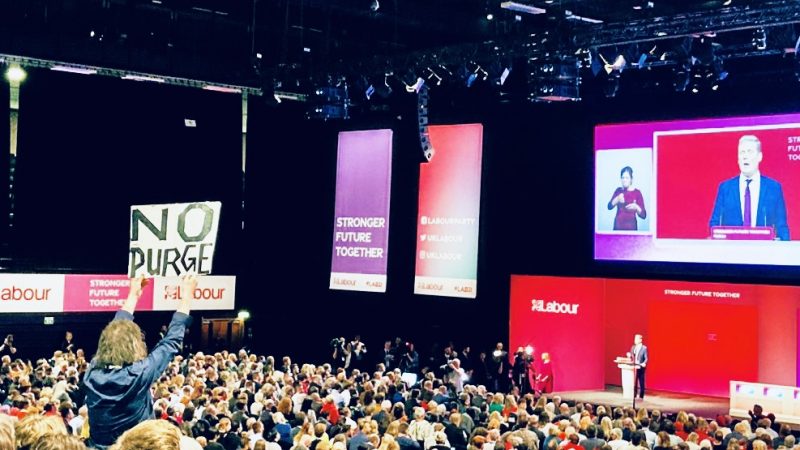
“Very, very long. But good.” This is how the first Labour MP I bumped into described Keir Starmer’s first in-person party conference speech, a major moment for the leader. It was originally reported that the essay by Starmer published by the Fabians last week would be 14,000 words: it turned out to be more like 11,500. It was briefed yesterday that the speech would be “about an hour” long, though his spokesperson warned that “it’s difficult to tell, with the applause and so on”. It was 90 minutes before Starmer wrapped up today, and tummies were rumbling in the hall. But what was in the 7,250-word address?
The Labour leader was introduced by Doreen Lawrence and kicked off with the message: “Louise Ellman, welcome home”. To the leadership, both women represent a commitment to equality – one element of the “Work. Care. Equality. Security.” tenets that were repeatedly cited during the speech. Starmer did not do a Neil Kinnock in 1985 or make an explicit statement about what kind of Labour members are not welcome in the party, as some of his supporters had hoped for. But the tribute to Ellman, who rejoined as a member after conference passed the Equality and Human Rights Commission rule changes, was an implicit signal to the same effect.
Starmer did announce policy, but it was limited to three new, rather subtle ones among a number of re-announcements: guaranteed support for mental health treatment available in less than a month; a “national mission” to make every home in the country warm, well-insulated and cheaper to heat within a decade; and a school improvement plan, including the reinstatement of compulsory work experience for two weeks and every young person getting to see a career’s adviser. This echoes the passage in Starmer’s essay on how all young people should learn the ‘soft skills’ taught in private schools.
The policy commitments were not especially headline-grabbing – not compared to the last leader’s conference speech we heard in 2019, when Jeremy Corbyn announced a Labour government would set up a publicly owned generic drugs manufacturer. The themes – work, family, technology in care and education – came through far more strongly than the concrete examples of what Starmer would do in power, because there were quite a number of them and all pretty subtle. Without centring a pledge like the Rachel Reeves one for investing £28bn of capital investment in the transition to a green economy for each year of this decade, or the labour market reforms promoted by Angela Rayner. These were mentioned but neither positioned at the centre of the speech.
The aspect most likely to get media attention was the heckling. It began as soon as Starmer took to the stage and the applause died down, and cropped up regularly throughout. The interventions varied from “Oh, Jeremy Corbyn” to the 2019 Brexit policy to ones Momentum said it preferred ahead of the speech such as a £15 minimum wage. Far from being frustrated, Starmer’s aides were delighted. “These heckles are an absolute gift,” one source said. “It didn’t knock Keir off his stride at all, if anything I think he showed the perfect response to it,” Starmer’s spokesperson added. He also said it appeared that some protest was prepared, as people brought red paper with them to give Starmer the red card. No hecklers were removed from the hall, which must have been a deliberate and likely planned decision, too.
Starmer proved that he could deliver a big speech well. It was too long and journalists – the non-Labour crowd here in Brighton – did privately say it was a bit boring. But how it will be communicated to members of the public who were not sat in the hall for 90 minutes is most important. While the heckling may have reflected well on him as a leader in terms of the forever war within the party, it is less certain that this being the most memorable moment plays particularly well with the electorate.
The final lines were well-crafted, tying together the values Starmer wanted to emphasise with the personal story he told: “Work. Care. Equality. Security. These are the tools of my trade. And with them I will go to work.” Just before the speech began, I bumped into a senior figure in the Labour leader’s backstage team. The rule changes passed on Sunday were a big success, and the argument that they should have been delayed never made sense, he said, pointing out that Labour would have been talking about them in the run-up to local elections instead of over just a few days. His assessment of conference? “It couldn’t have gone any better.” As the summit came to an end after Starmer’s speech, his team could not have been happier.




More from LabourList
Economic stability for an uncertain world: Spring Statement 2026
‘Biggest investment programme in our history’: Welsh Labour commit to NHS revamp if successful in Senedd elections
James Frith and Sharon Hodgson promoted as government ministers